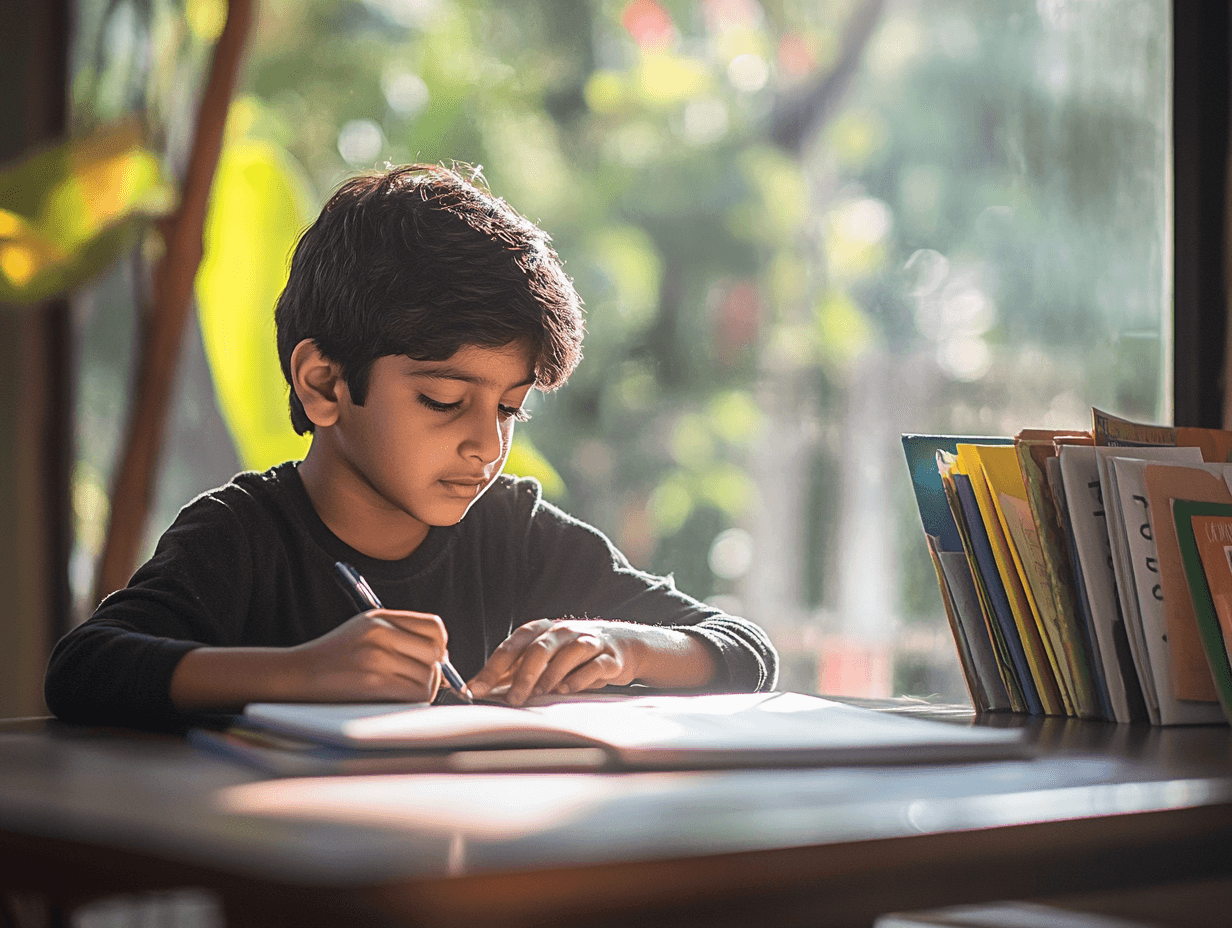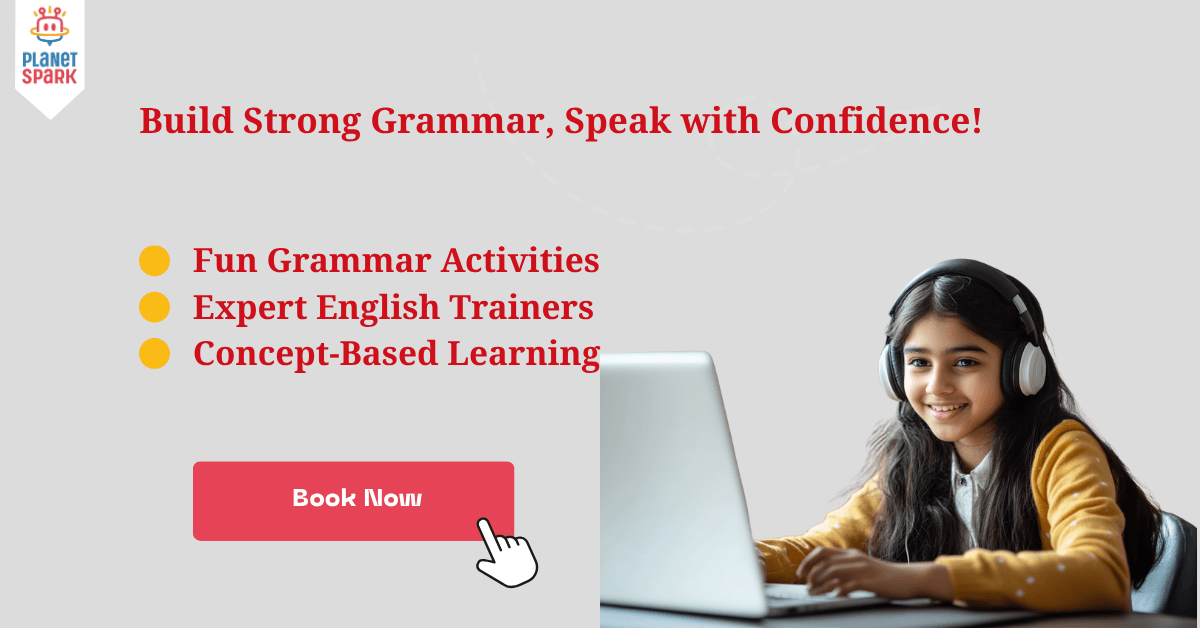Conjunctions for Class 7 with Examples and Exercises
Last Updated At: 17 Jul 2025
7 min read

Table of Contents
Learning conjunctions is an important part of English grammar, especially for class 7 students. Conjunctions help kids connect ideas, build better sentences, and improve both writing and speaking skills.
In this article, we will cover the basics of conjunctions for class 7, types of conjunctions, simple examples, and easy practice exercises. At PlanetSpark, children can also practise grammar in interactive classes that make learning conjunctions fun, engaging, and effective.
What Are Conjunctions for Class 7?
Conjunctions are joining words. They connect two or more words, phrases, clauses, or sentences together. Using conjunctions makes sentences sound natural and fluid. Imagine reading a story where every sentence starts with "I" or "She." It would sound dull and disconnected. Conjunctions solve that problem.
Examples of Conjunctions in Simple Sentences:
- Meeta likes pizza and pastries.
- Is she her friend or not?
- Kavish is playing, but Khushi is studying.
- Everyone hates Priya because she is rude.
In the sentences above, the words and, or, but, because are conjunctions. They join parts of a sentence together. Without them, you would need two or more sentences to say the same thing.
Learning conjunctions helps children:
- Write better essays and stories
- Speak fluently in speeches and conversations
- Avoid repetition in writing
- Build more complex and interesting sentences

"Mastering conjunctions is the first step toward writing like a pro."
Book Your Free Trial Class Today
Why Are Conjunctions Important?
Conjunctions are important because they:
Make writing smoother: Sentences flow better when ideas are connected properly.
Help in public speaking: Kids sound more confident and organised when they use conjunctions in speeches.
Improve comprehension: Understanding conjunctions helps children read and understand longer sentences easily.
Support creative writing: Whether it’s storytelling or essay writing, conjunctions help kids describe events clearly.
Types of Conjunctions for Class 7
Conjunctions are divided into three main types:
Coordinating Conjunctions
Coordinating conjunctions join words or groups of words of equal importance. They are the most commonly used conjunctions in English.
Common Coordinating Conjunctions:
- and
- but
- or
- nor
- for
- yet
- so
Examples:
- He was late for the class, yet the teacher didn’t scold him.
- Sheena likes singing and dancing.
- Rahul likes cooking, but Preeti hates it.
- No one was in Jaipur, so I attended the event alone.
These conjunctions link two complete sentences or phrases with equal weight.
"Confident writing starts with grammar practice. Give your child that boost."
Get Started with a Free Demo Class
Subordinating Conjunctions
Subordinating conjunctions join a dependent clause to an independent clause. They show a relationship like cause-and-effect, condition, time, or contrast.
Common Subordinating Conjunctions:
- because
- although
- even though
- since
- after
- if
- unless
- until
- while
Examples:
- I will do the homework after I finish my lunch.
- If you practise daily, you will improve.
- Though he’s late to class, he is doing well.
- Even though she studied hard, she failed the exam.
- Because it was raining, the match was cancelled.
Subordinating conjunctions help kids add more details to their sentences.
Correlative Conjunctions
Correlative conjunctions work in pairs. They connect words or phrases that have equal importance.
Common Correlative Conjunctions:
- either...or
- neither...nor
- both...and
- whether...or
- not only...but also
Examples:
- Either Riya or Ryan has taken the apple.
- Priya will neither go to Paris nor to America.
- Mothers are both loving and caring.
- She is not only a liar but also a cheater.
Correlative conjunctions are great for advanced sentence construction.

How to Use Conjunctions Properly
Using conjunctions correctly is just as important as knowing what they are. Here are some quick rules and tips:
No Comma for Simple Lists
If you are joining two similar words or phrases, do not use a comma.
Incorrect: She took the utensils and food from the kitchen.
Correct: She took the utensils and food from the kitchen.
Comma for Independent Clauses
If you are joining two independent clauses (complete sentences), use a comma before the conjunction.
Example: She took the utensils from the kitchen, and she brought food from the café.
Dependent Clauses with Subordinating Conjunctions
If the dependent clause comes first, use a comma. If it comes after the main clause, no comma is needed.
Example 1: Because he woke up late, he missed the bus.
Example 2: He missed the bus because he woke up late.
"When kids learn to connect ideas, they unlock the power of language."
Book a Free Demo and See the Difference
Quick Exercise: Fill in the Blanks
Try these to test your knowledge of conjunctions.
- Roota was ill, __________ she didn’t go to work. (so, because, as)
- You should get your driving license ____ you have to pay a fine. (or, nor, but)
- She didn’t place the order _____ there was no demand for it. (as, since, either)
- My grandmother has never been to America; ____ does she want to go? (neither, nor, either)
- I am exhausted ______ I have been playing all day. (so, because, therefore)
- She took us to the play zone ____ she also took us to McDonald's. (but, but also, also)
- ________ it was freezing, we still went out. (though, even though, even)
- Raman wasn’t terrified, ____ he was a little shocked. (if, but, although)
- The Taj Mahal is a historic site ____ is made of white marble. (and, also, but)
- You will get there, ________ we do. (as, as soon as, soon)
Answers
- so
- or
- as
- nor
- because
- but also
- even though
- but
- and
- as soon as
Fun Ways to Practise Conjunctions
At PlanetSpark, we believe kids learn best through fun and practice. Here are some activities parents and teachers can try:
Conjunction Story Chains: Each student adds a sentence to a story using a different conjunction. This builds fluency and creativity.
Conjunction Flashcards: Create flashcards with different conjunctions. Kids pick a card and create a sentence using that word.
Speech Practice: Ask kids to prepare a 1-minute speech about their day, using at least five conjunctions. This helps with both writing and speaking skills.
Worksheet Practice: For extra practice, download the Class 7 Conjunction Worksheet here. Worksheets help children revise and strengthen grammar concepts at their own pace.

How PlanetSpark Helps Kids Master Grammar
Learning grammar can sometimes feel boring for kids, but it doesn’t have to be. At PlanetSpark, we use interactive methods to help children enjoy learning English grammar, public speaking, and writing.
PlanetSpark’s Learning Features:
1:1 Personal Trainers: Kids get live, personalised feedback.
AI-Led Video Analysis: Our SparkX tool helps children improve their speech, tone, and delivery.
Spark Diary: Daily writing practice helps kids master grammar naturally.
Gamified Learning: Fun games and quizzes make grammar exciting.
Storytelling and Debating Clubs: Kids practise real-world communication in a supportive environment.
With over 1 million classes across 13 countries, PlanetSpark is trusted by parents who want their children to become better communicators.
Conclusion
Conjunctions are one of the building blocks of English grammar. For class 7 students, learning how to use conjunctions correctly improves both writing and speaking. Whether kids are writing essays, giving speeches, or telling stories, conjunctions help link ideas and make communication smoother.
If you want your child to master conjunctions and other grammar concepts in a fun, practical way, PlanetSpark is here to help. Our interactive programs focus on real-life application, helping children become confident speakers and writers.
FAQs
What are conjunctions for class 7?
Conjunctions are joining words that connect two or more sentences, phrases, or clauses to make language smoother and more meaningful.
What are the types of conjunctions?
There are three types:
- Coordinating conjunctions
- Subordinating conjunctions
- Correlative conjunctions
Can conjunctions improve writing and speaking?
Yes. Conjunctions help children write better sentences and speak confidently by connecting ideas naturally.
Where can I find practice worksheets for conjunctions?
You can download free worksheets from PlanetSpark’s website. Click here to access the Class 7 Conjunction Worksheet.
Personalized Communication Report
Record a video to get a AI generated personalized communication report for your child
Select Learner's Class

Hi There, want to try these
tips for your child with
LIVE with our expert coach?
Let's check your child's
English fluency